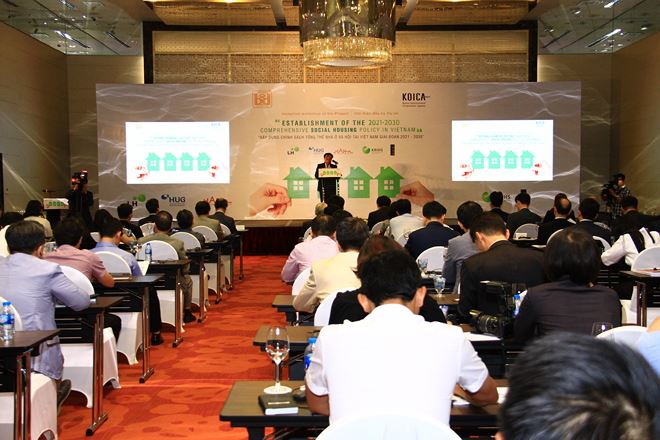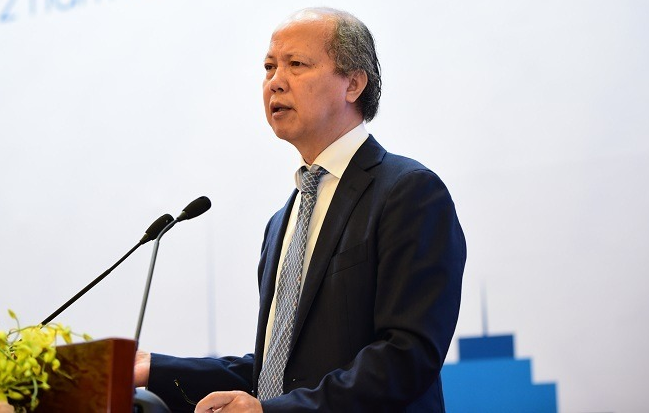Social housing is still an urgent need
At the seminar, delegates and experts from Vietnam and Korea agreed that housing is a basic social need that every class, every country tries to meet regardless of economic development and political regime.
Deputy Minister of Construction Mr. Nguyen Van Sinh stated that Vietnam has a rapid urbanization rate, expanding at about 1 million citizens every year. It is estimated that by 2020, 40% of the population will be living in the city. Accordingly, demand for social housing is increasingly urgent, especially in two big cities Hanoi and Ho Chi Minh City, where land funds for housing, transport, and service development are in serious shortage.

“Establishment of the 2021-2030 Comprehensive Social Housing Policy in Vietnam” seminar.
Three recommendations of VNREA Chairman
According to Chairman of Vietnam National Real Estate Association Mr. Nguyen Tran Nam, cities of Vietnam have had basic developments in the last 20 years, forming many large residential and service areas that partly meet people’s needs and habits. Housing accounts for 70% of the real estate market and achieves the housing development task approved by the Prime Minister. The quality has been improved but the pressure for social housing remains high.
“Housing is not a luxury but a necessity. People may not buy cars but they cannot live without a house. Back in the days, our country was poor but the government still left a part of the budget to invest in Kim Lien or Trung Tu collective quarters. Today, many provisions in laws and policies consider social housing construction an important chapter,” said Nguyen Tran Nam, Chairman of VNREA. “I believe that to do social housing, the most important is land and money. Land could be planned, with 20% taken out from construction projects in each locality, while capital is a completely different story.”
Accordingly, Nam made 3 recommendations with the first being social housing development in accordance with zones and plans. It is crucial to well inspect, audit, and encourage the localities to implement social housing policies.
The second motion is to open up capital sources for the market. In particular, it is necessary to quickly implement an interest compensation mechanism for 4 state-owned commercial banks, allowing both investors and customers to borrow. Thus, with 1 billion VND of interest subsidy, 33.3 billion VND can be mobilized (estimated interest rate is 3% per year) from non-budget capital.
In the long-term, there should be a preferential credit mechanism for customers and investors of social housing projects, as stipulated in the 2014 Housing Law and guiding documents, as well as supporting incentives for affordable housing (less than VND 1.05 billion) similar to the previous successful Resolution No. 02 by the government.
When housing demands in urban areas are becoming increasingly urgent, especially in the context of high land price compared to affordability, housing savings model needs to be considered, to raise people's responsibility and let them actively participate in raising capital and responsibility with their own housing demand.
Housing savings fund should be a ‘closed’ model, only mobilizing finance from one single source being households and individuals who have a purpose of borrowing money for houses. This is a socialized model that people voluntarily participate and contribute, taking advantage of their private capital and idle money, instead of state’s financing. Currently, many countries have been very successful with this model of housing savings fund and it is playing a critical role in the process of buying and owning houses of Europeans.
The last is to develop rental housing. Although housing demand is huge, house prices in big cities are still too high compared to the average income, limiting home ownership of the middle class and the young. In the long-run, people need to change their mindset from home owning to accommodation living (house renting). Young people, who have not accumulated much, should not over-spent buying a house but instead, renting in projects that are convenient and financially suitable. This is a common trend around the world and also increasingly popular in Vietnam.

Mr. Nguyen Tran Nam, Chairman of VNREA.
Experience from Korea
According to Dr. Mon Hyogon, a Korean social housing expert, since the 70s, the Korean government has built a social housing system by investing capital into Korea Housing Company. At the same time, down-sized apartments were effectively established to accommodate low-income families. In addition, the Korean government pledged to stabilize the housing market for low-income individuals by strengthening housing supply and tightening real estate speculation.
“The Vietnamese government is currently supporting enterprises to build social houses through policies such as land tax exemption and reduction. After practical surveys and research, we offer some advices suitable for Vietnam. For land purpose determination, it is vital to diversify investors and social housing providers, and not to depend on one private business. Moreover, different types of social housing also need to be diversified such as renting, leasing,” said Dr. Mon Hyogon. “Especially, the relationship between housing development and land fund has to be clarified so that there would be land for affordable housing construction. The last piece of advice is to have a social housing credit system; a stable source of finance is the most important element in social housing sustainable development.”





















